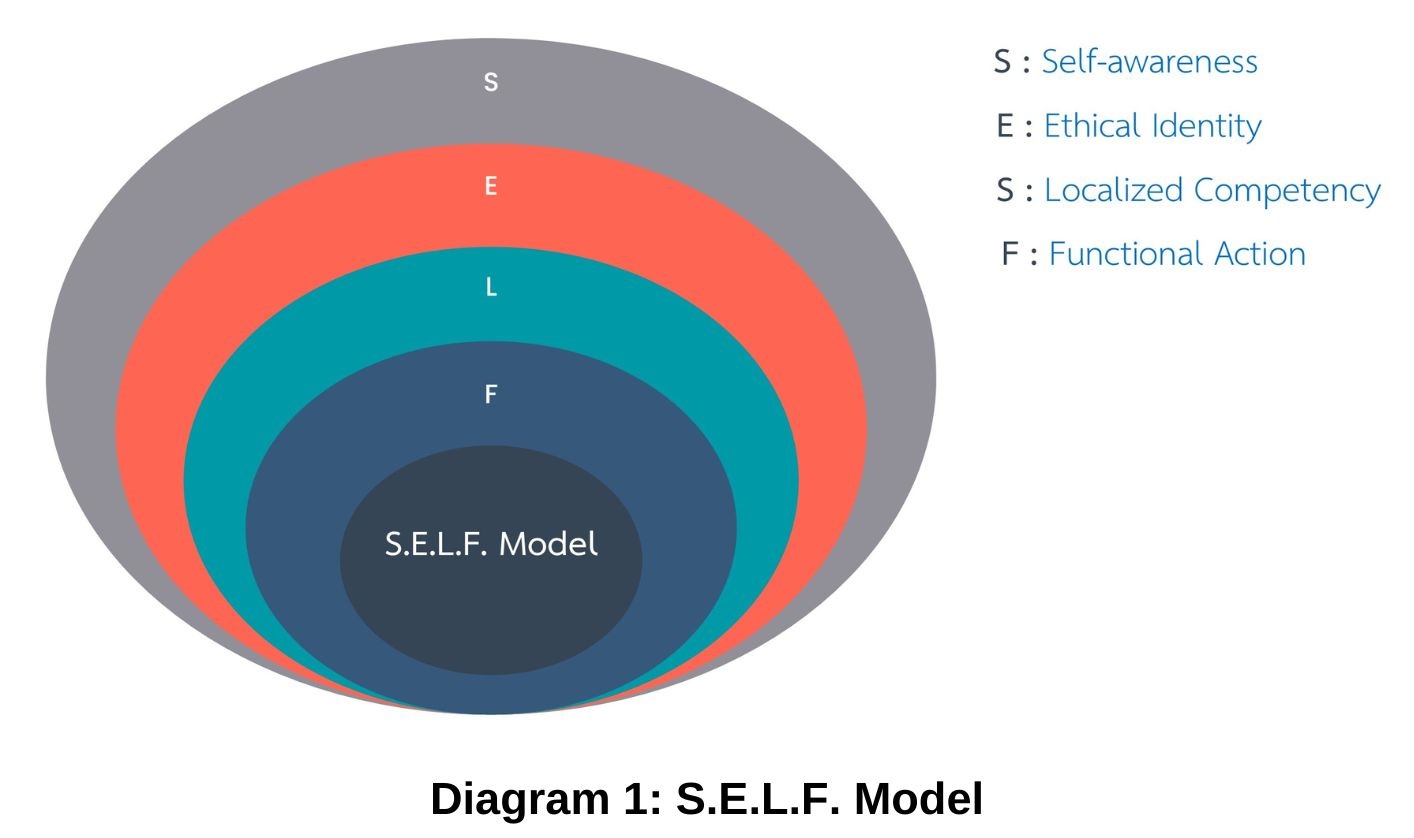The Application of the 17th Royal Working Principle : Self-Reliance
Keywords:
Application, The 17th Royal Working Principle, Self-RelianceAbstract
This academic article aims to analyze and interpret the 17th Royal Working Principle of His Majesty King Bhumibol Adulyadej The Great, focusing on the concept of self-reliance from a philosophical perspective, and to propose practical guidelines for its application in real-life contexts systematically. The study highlights self-reliance as a worldview that empowers inner potential, not merely as a survival tool or economic strategy. It examines self-reliance through the lenses of Buddhist philosophy, Thai practical philosophy, and postmodern middle-path philosophy, illustrating how self-reliance serves as a pathway to restoring human freedom across dimensions of the mind, ethics, society, and sustainable development. The article presents techniques for application at various levels, from individuals, families, and communities to organizations and public policy, and synthesizes new knowledge in the form of the S.E.L.F. Model, comprising four core components that emphasize “inner development for outer impact, self-reliance for the common good” as a foundation of social capital, fostering a culture of stability and mutual support. The study concludes that self-reliance is the foundation of genuine quality of life - serving as a way of living, an ethical framework, and a practical tool for sustainable development. The concept aligns with human nature and can be applied at all levels of Thai society.
References
กรมการศาสนา. (2525). พระไตรปิฎกฉบับหลวง เล่มที่ 1-45. กรุงเทพฯ : โรงพิมพ์การศาสนา.
ปกรณ์กิตติ์ ม่วงประสิทธิ์, ศิริณา จิตต์จรัส และ อรอุษา ปุณยบุรณะ. (2563). ศาสตร์พระราชากับการพัฒนาการบริหารการศึกษาอย่างยั่งยืน. วารสารศึกษาศาสตร์ มหาวิทยาลัยศิลปากร, 18(2), 21-42.
พระครูวิบูลสีลพรต. (2563). ศาสตร์พระราชากับพุทธวิธีในการพึ่งตนเองตามแนวเศรษฐกิจพอเพียงของชุมชนแสงจันทร์ จังหวัดบุรีรัมย์. วารสารสันติศึกษาปริทรรศน์ มจร, 18(2), 726-736.
พิเชษฐ์ หาดี. (2565). การน้อมนำหลักการทรงงานของพระบาทสมเด็จพระเจ้าอยู่หัว รัชกาลที่ 9 ไปประยุกต์ใช้ในการบริหารจัดการวิทยาลัยเกษตรและเทคโนโลยีศูนย์ศิลปาชีพบางไทร. วารสารวิจัยและนวัตกรรม สถาบันการอาชีวศึกษากรุงเทพมหานคร. 5(1), 163-188.
รัชนี อิ่มอก. (2564). การพัฒนารูปแบบการจัดการเรียนรู้ตามหลักการทรงงาน ของพระบาทสมเด็จพระเจ้าอยู่หัวรัชกาลที่ 9 เพื่อส่งเสริมความเป็นพลเมืองดีที่ใส่ใจในสังคม. วารสารสังคมศาสตร์และมานุษยวิทยาเชิงพุทธ, 6(2), 204-220.
วิโรจน์ เจษฎาลักษณ์ และคณะ. (2558). การดำเนินชีวิตโดยใช้การพึ่งตนเองตามปรัชญาเศรษฐกิจพอเพียง ในโครงการชั่งหัวมัน ตามพระราชดำริ กรณีศึกษา : เกษตรกร บ้านหนองคอไก่ อำเภอท่ายาง จังหวัดเพชรบุรี. Veridian E-Journal, Slipakorn University, 8(2), 1114-1125.
ศุภฤกษ์ สังข์แก้ว. (2564). การเพิ่มประสิทธิภาพการปฏิบัติงานของผู้นําท้องที่โดยการประยุกต์ใช้หลักการทรงงานของในหลวง รัชกาลที่ 9. หลักสูตรรัฐประศาสนศาสตรมหาบัณฑิิต มหาวิทยาลัยรามคําแหง. [ออนไลน์]. แหล่งที่มา : https://www3.ru.ac.th/mpa-abstract/index.php/abstractData/viewIndex/428 [15 พฤษภาคม 2568].
สำนักงานคณะกรรมการพิเศษเพื่อประสานงานโครงการอันเนื่องมาจากพระราชดำริ (สำนักงาน กปร.). (2559). หลักการทรงงานในพระบาทสมเด็จพระบรมชนกาธิเบศร มหาภูมิพลอดุลยเดชมหาราช บรมนาถบพิตร. (พิมพ์ครั้งที่ 11). กรุงเทพฯ : สำนักงาน กปร.
สำนักงานคณะกรรมการอาหารแห่งชาติ. (2551). พระราชบัญญัติคณะกรรมการอาหารแห่งชาติ พ.ศ. 2551. [ออนไลน์]. แหล่งที่มา : https://www.sdgmove.com/2021/05/11/sdg-vocab-food-security/?utm_source=chatgpt.com [15 พฤษภาคม 2568].
สุเทพ ศรีบุญเพ็ง, วิโรจน์ เจษฎาลักษณ์. (2558). การประยุกต์หลักปรัชญาเศรษฐกิจพอเพียงในการดำเนินธุรกิจของร้านชัยเจริญเมล็ดพันธ์ข้าว ตำบลดอนกำยาน อำเภอเมือง จังหวัดสุพรรณบุรี. กรุงเทพฯ : มหาวิทยาลัยศิลปากร.

Downloads
Published
How to Cite
Issue
Section
License
Copyright (c) 2025 Institute of Sufficiency Journal

This work is licensed under a Creative Commons Attribution-NonCommercial-NoDerivatives 4.0 International License.



